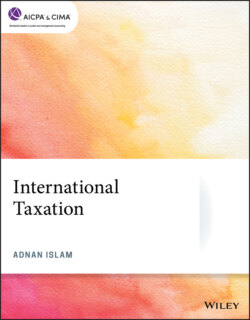Читать книгу International Taxation - Adnan Islam - Страница 25
Foreign Tax Credit Regulations and other U.S. international tax provisions
ОглавлениеOn March 4, 2019, Proposed Regulations provided that individual U.S. shareholders of CFCs will be eligible to apply a 50% deduction on taxation of GILTI. Individual U.S. shareholders who make the Section 962 election will also be permitted to take the Section 250 deduction with respect to their GILTI inclusion amounts. This treatment should result in individual U.S. taxpayers who choose to make the Section 962 election seeing a decrease in U.S. taxation of their GILTI inclusion amounts from 37% down to (a potential) 10.5%, also subject to further reduction by applicable FTCs. Note that Smith v. Comm’r, 151 T.C. No. 5 (2018) (Tax Court case) found that a “Section 962(d) distribution” from a Hong Kong CFC was not qualified dividend income. Instead, it was subject to ordinary income tax rates.
The Section 902 deemed-paid foreign tax credit on dividends received from foreign subsidiaries has been repealed.
There are separate baskets for foreign branch income and GILTI for foreign tax credit purposes.
The current law 50-50 sourcing rule, for income from the sale of inventory produced partly in and partly outside the United States, has been modified by allocating and apportioning such income solely on the basis of production of that inventory. Therefore, inventory produced entirely in the United States will be 100% U.S.-source income for foreign tax credit purposes, even if title to such inventory is outside the United States.
A new election is also available for foreign tax credit purposes. Generally, under current law, in situations in which a taxpayer incurs a loss and is limited in regard to claiming a foreign tax credit, U.S.-source income can be recharacterized as foreign-source income in subsequent years in an amount equal to the lesser of the entire amount of such loss that is not carried back or 50% of the taxpayer’s U.S.-source taxable income for the succeeding year. For taxable years beginning after December 31, 2017, and before January 1, 2018, taxpayers may elect to compute the percentage-based amount differently if it results in a higher amount.
Provisions requiring inclusion of foreign base company oil-related income as a category of foreign base company income have been repealed.
Provisions requiring inclusion of foreign base company shipping operations income when investments in CFCs decrease have been repealed.
A change has been made to the CFC attribution rules (that is, repeal of Section 958(b)(4)) such that, in certain situations, stock held in a foreign corporation by a foreign person can be attributed to a U.S. person for purposes of determining CFC status of a corporation (but see Notice 2018-13).
A change has been made to the definition of a U.S. shareholder to now include any U.S. person who owns 10% or more of the total value of shares of all classes of stock of a foreign corporation, in addition to the current 10% voting stock rule (which means it is easier to become a “U.S. shareholder” of a CFC).
A change has been made to eliminate the 30-day minimum holding period for determining whether a U.S. shareholder must include the CFC’s Subpart F income (which means it is easier to have or own a CFC).
Notice 2019-01 and Proposed (Foreign Tax Credit) Regulations replace the former pooling system with intricate rules for calculating foreign taxes incurred by a CFC that are “deemed paid” by a U.S. shareholder, and the respective shareholder’s FTCs. Foreign taxes are eligible to be treated only as deemed paid, and the resulting FTCs are available only to a U.S. shareholder, in respect of Subpart F and GILTI inclusions and distributions of previously taxed earnings and profits (PTEP). With some exceptions, these rules approximate a “tracing” regime under which FTCs are available only to the extent the underlying foreign taxes are attributable to particular items of income giving rise to Subpart F or GILTI inclusions to the U.S. shareholder, or to foreign taxes imposed on distributions of PTEP.
For purposes of the Section 960(b) credit, the proposed regulations require the shareholder to maintain up to 10 annual accounts of previously taxed earnings and profits and related foreign income taxes (PTEP groups) for each CFC. Recall that, before Section 959(c)(1) and (c)(2), E&P was referred to as PTI; however, the proposed regulations favor the PTEP acronym. The 10 accounts relate to the different types of Section 959(c)(1) and (c)(2) PTI (or PTEP) attributable to different inclusions, such as under Subpart F, Section 965, GILTI and Section 956. PTI in one PTEP group may be reclassified as PTI in another PTEP group as a result of a Section 956 income inclusion (investment in U.S. property).
The proposed regulations require each PTEP group and related foreign income taxes be maintained in annual layers.
